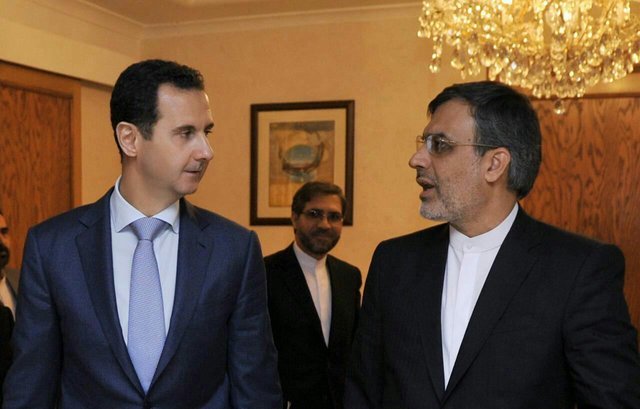Iran’s Deputy Foreign Minister for Arab and African Affairs was in Damascus this week, having met with Syrian President Bashar al-Assad on Wednesday, in another attempt to find a solution to what seems like a never-ending conflict in war-torn Syria.
"Syria’s resilience and the consecutive successes it has achieved on the war on terrorism as well as the restoration of security to all the Syrian cities and areas would be a victory not only to the Syrian people, but also to the Iranian people and all other peoples who believe in their right to defending their countries, independence and sovereign decision," Hossein Jaberi Ansari said in the meeting, according to Syrian Aeab News Agency.
Assad defended his actions in a country he has ruled for over 17 years, saying Syria has adopted the right policies in the face of those followed by “some regional and Western countries” that he believes to be pursing an agenda at odds with his own.
During Ansari’s visit the two agreed on the importance of continuing coordination between Damascus and Tehran, especially in relation to combating terrorism and regional issues.
Before landing in Damascus, Ansari was in Moscow, where he met with the Russian President’s Special Envoy for Syrian Affairs Alexander Lavrentiev, Deputy Defense Minister Alexander Fomin and Deputy Foreign Minister Mikhail Bogdanov.
Ansari is Iran’s top official assigned to the Syrian peace process. He acts as Tehran’s negotiator in the talks that have come to be known as the Astana Process, because they are held in Kazakhstan’s capital. Iran, Russia and Turkey act as guarantors of the current ceasefire in Syria, meant to incrementally de-escalate the tension there and bring what has been nearly eight years of war.
A seventh round of Astana Process talks were held in Astana from October 30-31, which built upon a groundbreaking fourth round, held in May, when a memorandum of understanding was signed that set up the de-escalation zones and is credited for dramatically reducing hostilities in the country.
The Syrian National Dialogue Congress, formerly referred to as the Congress of the Peoples of Syria, will meet Saturday in Sochi, Russia to try and expand the scope of participants in the peace process. The idea is to give local tribesmen and residents a sense of political buy-in, with the hope of tampering down inter-tribal, clan, and religious rivalries.
Iran and Russia have grown closer over their mutual support for the Syrian government, which is frequently accused by the U.S. of human rights abuses against the Syrian people. Both Tehran and Moscow have given Assad cash, arms and military support to boost the capacity of the Syrian military. Despite concerns by the international community of Assad’s regime, the alliance has been successful: Syria has reclaimed much of the territory it had lost to the Islamic State militant group (ISIS, or ISIL) and other insurgents, which have been trying to knock Assad from power since 2011.
In 2016, Iran allowed Russian planes to use its territory to bomb positions in Syria, and the two countries managed to draw Turkey, which deeply opposes Assad, into peace talks following the Syrian government's recapture of Aleppo in December.
This past Tuesday, Lavrov said that the presence of Iran in Syria is legitimate, adding that Russia has not promised to ensure a withdrawal of pro-Iranian forces from Syria. However, it was not clear if Lavrov’s comments related to reports that the deal would place restrictions on how close to the Israeli-Syrian border Iran-backed groups would be allowed to remain.
This statement made after a Western security official told the BBC on November 10 that Iran is establishing a permanent base south of Damascus, 30 miles from the Israeli border. Following the report, Israeli Prime Minister Benjamin Netanyahu and other Israeli officials have warned that permanent Iranian bases in Syria will not be tolerated.
According to a report by the Syrian Centre for Policy Research, the conflict in Syria has claimed the lives of over 470,000 people, injured 1.9 million others, and displaced nearly half of the country’s pre-war population of about 23 million within or beyond its borders.







 Armenian sappers commenced on Monday mine-clearance operations in the territories adjacent to the Saint Mary Church in village of Voskepar (Armenia...
Armenian sappers commenced on Monday mine-clearance operations in the territories adjacent to the Saint Mary Church in village of Voskepar (Armenia...
 The Mine Action Agency of Azerbaijan (ANAMA) reported on Thursday the discovery of a significant amount of explosives in the Khojavand district of ...
The Mine Action Agency of Azerbaijan (ANAMA) reported on Thursday the discovery of a significant amount of explosives in the Khojavand district of ...
 Iran’s Foreign Minister, Hossein Amir-Abdollahian, has labeled a foiled Israeli drone attack in certain parts of the country as a "failure" for Isr...
Iran’s Foreign Minister, Hossein Amir-Abdollahian, has labeled a foiled Israeli drone attack in certain parts of the country as a "failure" for Isr...



